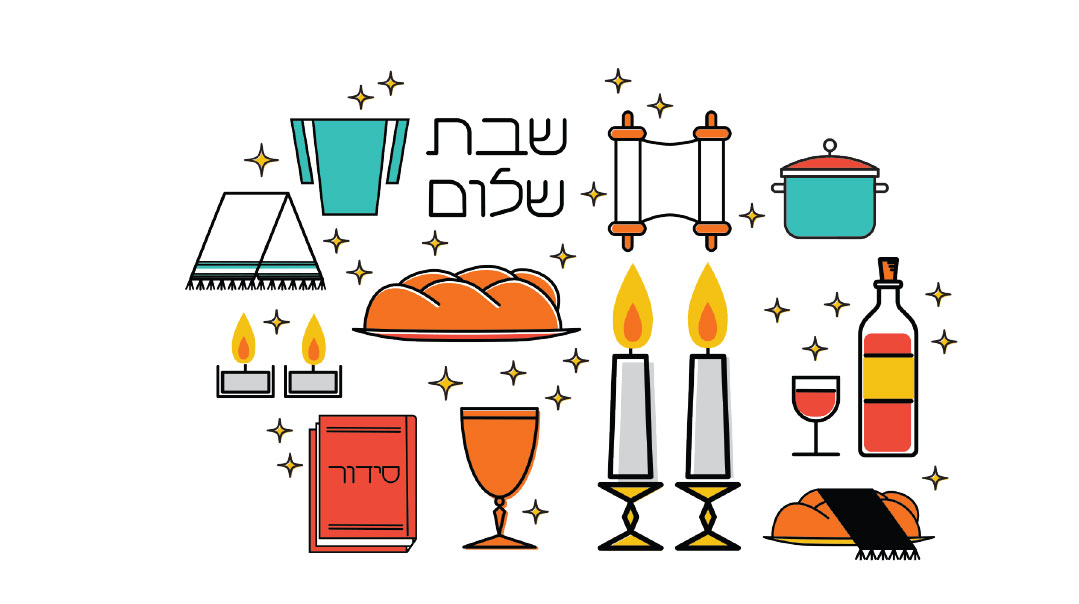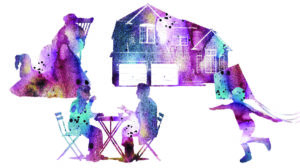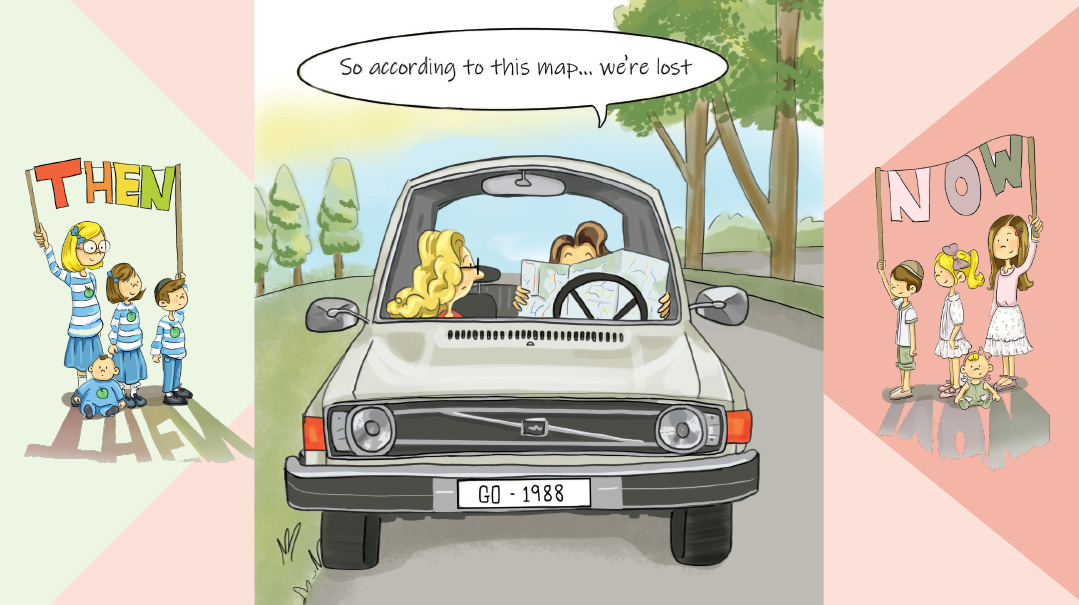Reclaiming Shabbos
| November 13, 2019Mothers reclaim and recapture the magic of Shabbos

When I was a teen, Shabbos used to be a special day, a holy time. It was an opportunity to connect with Hashem, eat beautiful meals, spend time with my family, read, and of course, rest.
Hashem showered me with blessings, and my Shabbos today looks… well… different.
It features sticky grape juice spills, tantrums, and whining. It’s a Shabbos of bored children and a yearning… for my pillow. The demands keep coming, and I find myself with a growing desperation to recapture the Shabbos of my youth.
How do other mothers do it? I found myself wondering. I set out to discover their secrets
Prepped and Ready
Get to the finishing line with little ones underfoot
It’s difficult to prepare for Shabbos with little ones around, so I try to do as much as possible when they’re in nursery or taking a nap. To manage the things that must be done on Friday afternoon, when they’re home, I set them up with engaging games, and give them new activities before they get bored. Markers and papers, magnetic boards, and Daddy-supervised bath play also work.
—Nava Milstein, Kiryat Sefer, two children, aged one and three
It’s important to cut corners as much as possible and get as much help as you can afford. Focus on the main dishes. Choose only simple, quick recipes for sides, and make them after the main dishes are done. Have a cut-off point. At a certain time, no later than two or three hours before zeman hadlakas neiros, close the kitchen. Make this nonnegotiable.
—Rebbetzin S. Feldbrand, Boro Park, seven children
I work full-time. When my children were younger, I’d wake up at 4:30 a.m. to prepare for Shabbos, doing everything before 6 a.m.
—Chana Green, Far Rockaway, six children, aged nine to twenty-five
In my parents’ home, there was tremendous excitement surrounding getting ready for Shabbos. We started getting ready for Shabbos on Wednesday. My mother used to announce, “Now we’re making the kugels, now we’re making this, now we’re preparing that.” Her excitement was contagious. We really felt like we were preparing for a queen’s visit. She never asked us to help, but we wanted to; we’d constantly ask her what we could do.
— one of Rebbetzin Machlis’s daughters
I make the most of time I have alone, when my youngest is napping and the rest are at school. Once they’re home, I include them when I can. Otherwise, I get them busy in an area away from where I’m working. Although it sounds horrible, I ignore them a bit to make it all happen. I daven that Hashem will help me get to Shabbos on time — there isn’t really another way.
—Miriam Roth, EY, thirteen children, aged two to twenty-seven
My best tip is to use your freezer and cook during the week. I don’t remember when I last cooked an entire Shabbos in one week. I bake four to eight pounds of challah at a time. I make sure to always have three cakes, two different desserts (doubling each recipe), eight kugels, four chickens, four salmons, and a huge batch of kneidlach in my freezer. On Thursday evening or Friday morning, my husband watches the kids for 30 minutes while I put up the soup, make a cholent, and sometimes make a dip and a salad or two.
—Yaffa Apfelbaum, Germany, three children, aged one and a half to eleven
Shed Light
You’ve bentshed licht. What now?
When I had one child, and even for a little while after my second was born, I’d daven for over half an hour, often while nursing or holding the baby. Now that my kids are older and more demanding, I can’t do that anymore.
An idea I recently got from a former teacher seems to be working: I give the kids a snack while I daven. We eat very healthfully, so this candlelighting treat is eagerly anticipated, and usually I get at least ten minutes to daven — even if it’s interrupted.
—Nava Milstein
I say the yehi ratzon after candlelighting. I try to do a little more davening, depending on my mood and what’s going on. I was inspired to do this after a visit to Rebbetzin Koledetsky. I then try to take the children out, either to the park or to play near the house. The great outdoors does wonders for all of us.
I make sure to cut a salad before my husband gets home from shul. Often the little kids help — they each cut their own salad. I even have a special knife that isn’t sharp for my two year old.
—Miriam Roth
I often collapse after lighting candles. Sometimes I even get in a nap before the men come home. Sorry, no holiness here.
—Chana Green
Growing up, we’d get ready for the seudah after my mother lit candles. There were so many people coming — we had to finish making the salads, put the food into the serving bowls, and set the table. Now that I have my own family, I daven Kabbalas Shabbos and Maariv while the kids play nearby. If there’s time left after I daven, we go outside and take a walk together.
—one of Rebbetzin Machlis’s daughters
I used to sit on the couch and read to the children. Alternatively, I’d daven with them. Since I have a bunch of boys, I found it easier to engage them than give them free rein.
—Rebbetzin S. Feldbrand
I wish I was the Mommy who danced with her kids while singing Lecha Dodi and read them parshah stories that kept everyone mesmerized. The reality is that I plop down on the couch and read the serials in Family First.
I have a deal with my children: If I get 20 minutes of quiet, they get Shabbos nosh. Part of the deal is that the older ones watch the younger ones. After that we set the table together. If there’s time left, we do sing Lecha Dodi.
—Yaffa Apfelbaum
Time for Tefillah
Carve out time to connect
I used to try to daven while the kids played, but it didn’t work. They’re too young to entertain themselves or each other for long stretches of time, and we all got frustrated. Someone always needed to be cleaned, fed, or comforted. I stopped davening for a while, but felt guilty about it.
What we do now is start the seudah when my husband comes home from shul. We have Kiddush, challah, and first course, and then take a break. My husband plays with the kids, sings zemiros, and dances with them while I daven. I hope it shows our kids how much we treasure davening and connecting to Hashem.
—Nava Milstein
I try to daven haneitz, before the kids wake up. It’s a beautiful time of day. When they’re all sleeping, I can connect and focus.
—one of Rebbetzin Machlis’s daughters
I usually daven Minchah on Shabbos afternoon, and when we say Pirkei Avos, I aim for that too. I also say Tehillim. I accomplish this by playing with the kids for a while, then I have them read quietly while I daven, and afterward we play some more. When I sandwich my davening between spending time with them, I find they don’t mind as much.
—Malkie Licht, Boro Park, three children, aged two to seven
I try hard to get up before the kids do to daven. It makes a tremendous difference in my davening. I find it difficult to daven, even without concentrating, when the kids are around, everyone needs something or pulls at me. When I don’t manage to get up early, I do my best, and whichever kids are around get a reward for letting me daven.
—Miriam Roth
I davened only if I got up early, or if I could get the children to daven along with me. For many years, after saying brachos, my Tehillim was my close companion because I could say a kapitel at a time.
—Rebbetzin S. Feldbrand
Serve up the Seudah
Keep the kids engaged and at the table
My husband works late during the week, so he enjoys spending time with the children on Shabbos. We focus on the kids and try to get some insight into their lives. We encourage them to say divrei Torah.
I’ve also found that if you have good food, they’ll stick around and participate more. When my son goes to the teen minyan, he often fills himself up at the kiddush there, and goes straight to the couch after we make hamotzi. When we started making homemade sushi, he came back to the table every time. Good food works better than yelling and nagging.
—Chana Green
Zemiros. We sing and dance together and often segue into seasonal singing, for Simchas Torah, Purim, etc. This is a major attraction of our Shabbos seudos. Our guests always love it. It’s exciting and the kids enjoy it.
—Nava Milstein
My kids can be very rowdy. We don’t make them stay at the table. We have guests often; it helps maintain a normal atmosphere.
—Miriam Roth
I buy prizes at the shekel store, which we use, along with healthy treats, to reward the grandkids for answering questions on Jewish trivia or the parshah. There’s also lots of singing on Zeidy’s lap. We have each child share an act of self-control from their week and something that made them happy.
—Sara Gersig, Yerushalayim
four children, all married; now it’s the grandchildren
I’d prepare for the Shabbos table the same way I prepared for a class. I chose topics for discussion and stories on the parshah.
—Rebbetzin S. Feldbrand
Some fathers like to say lots of divrei Torah, some say stories. It doesn’t matter, it’s just important that the atmosphere at the table is pleasant and fun. I always involve the kids in the preparations. That way they feel the seudah is theirs.
—one of Rebbetzin Machlis’s daughters
Full Afternoons
Surviving — and even thriving — all those hours
Something that’s made the long hours easier was dedicating “Shabbos books” and “Shabbos games” that we only read and play with on Shabbos. This keeps them fresh and exciting, for the kids and for me. The kids wait eagerly to play with them.
—Nava Milstein
We struggle with this. Having lots of nosh available helps. We also go to the park or for a walk. This may sound strange, but I’ve found that a walk in the rain is the best. The kids have loads of fun getting wet, and few other people are around. What’s the worst that happens? A change of clothes (for each kid) and a bit more laundry? When you do as much laundry as we do, it makes no difference.
—Miriam Roth
We have many relatives in our neighborhood, so when the kids were younger, all the cousins would crash at our house, or we’d crash at theirs. Now that my children are older, they meet up with friends. I put candy on the table as “Shabbos Party” so I know they’ll be back at some point during the day.
—Chana Green
On Shabbos I was completely there for the kids. I took out new books from the library to read to them. Alternatively, I told stories from seforim I already owned — for hours.
Weather permitting, we’d go to the park. The walk to the park was also an opportunity to schmooze. We did have guests, but usually only for one meal. The children often found our eclectic visitors to be most entertaining, so I didn’t feel I was depriving them of attention by having guests.
—Rebbetzin S. Feldbrand
When we go to Yerushalayim, to my parents’ house, we often walk to the Kosel, which they love. When we’re home, we go to the park, where they meet friends, play, and run around.
—one of Rebbetzin Machlis’s daughters
After the seudah, we have an hour of quiet, and after that I cut up some fruit and we snack on it. Then we play a game, followed by quiet reading time. Afterward we meet up with friends.
—Yaffa Apfelbaum
Sweet Slumber
Can it be a day of rest for a mommy?
My husband and I take turns napping. I think women should nap, especially if they’re up at night with a baby, expecting, or otherwise not at peak strength.
—Nava Milstein
I usually nap. Sometimes the little ones nap at the same time, sometimes they play. Sometimes there isn’t enough supervision. It used to bother me a lot, and it was hard for me to just leave, but when you’re working hard taking care of a big family — especially when you’re expecting — you can’t just keep going and going. I came to view it as first aid, ensuring there was something left of me to be able to go on.
But dynamics do change. Lately I try to stay up for a while, or even all afternoon, to be with the kids.
—Miriam Roth
My mother never, ever napped. The meal didn’t start till one, and often only ended at around four. She’d speak to guests or say Tehillim after the seudah. Napping wasn’t on her radar.
—one of Rebbetzin Machlis’s daughters
I ask the older ones to play quietly while the little one naps. I rest in bed, but I don’t allow myself to fall asleep.
—Yaffa Apfelbaum
Make it Meaningful
How to access the gifts of the day
As our world gets more technological, the lines between work and home become blurred. (Anyone else guilty of checking e-mails at 7 p.m?) I’m even more grateful for Shabbos now.
My goal for Shabbos is to focus on my family and not think about work at all. Usually, by the time Shalosh Seudos comes, my mind is redirected. I’m more in tune with my family and focus on them more than I can throughout the week. I take mental notes of what they need and reflect on our discussions.
On early winter Shabbosim, I’m in bed by 8 p.m. As I get older, I find myself waking up in the middle of the night. When that happens, I make myself a cup of tea, sit down, and say Tehillim. It’s so quiet, with the ticking clock the only sound as I daven. After an hour or two, I get tired again and go back to sleep. It’s a special time for me, a way of tapping into the kedushah of Shabbos.
—Chana Green
We try to say “lichvod Shabbos Kodesh” during our preparations. If the kids help make something, or before they shower, we say it together. It creates a mentality.
—Miriam Roth
I try to read certain books on Shabbos that I don’t read at other times. Not heavy books, but not novels. Things like well-written biographies or Jewish self-help books.
—Nava Milstein
It’s up to the parents to create a Shabbos that the children look forward to. Children can’t relate to kedushah, but they do relate to treats and an extra-large dose of warmth and attention.
Inspire yourself by reading seforim like Rav Pincus on Shabbos (available in English), or Sidduro shel Shabbos. This will make it possible for you to inspire your children. If it’s obvious that you delight in Shabbos, your children will savor Shabbos as well.
—Rebbetzin S. Feldbrand
I tell my grandchildren that Hashem loves us so much and gave us the gift of Shabbos, and that even if a non-Jew wants to keep Shabbos, Hashem doesn’t let him, because it’s only for us. We talk about the pretty clothes, special games, treats, and spending time with family that we get to experience each Shabbos.
—Sara Gersig
There were a few things from my childhood that made Shabbos special. We didn’t discuss weekday things on Shabbos. Ever. My father instilled in us that we have six days a week to talk about everything worldly — work, money, jobs. On Shabbos, we had to talk about other, holier things.
We didn’t play Monopoly on Shabbos, because it was too weekday, even if it’s fine halachically. My father said there are so many board games out there, why play a game on Shabbos that’s all about buying and selling?
We used to say Tehillim mechulak on Shabbos. My mother would go to Rebbetzin Tarshish’s shiur late Shabbos afternoon, and we’d watch our younger siblings for an hour. Sometimes we’d go to the Kosel or Kever Shimon Hatzaddik.
Today, in my own home, the spiritual highlight of my Shabbos is davening haneitz in shul Shabbos morning while all my children are sleeping. A mother needs to give herself things that give her pleasure. That’s why my mother was able to give so much, I think. She took care of herself and her needs. She’d take herself off to do hisbodedus and come back feeling stronger. Whether it’s coffee or an exercise class, you need to take care of yourself and do things that will help you keep going.
—one of Rebbetzin Machlis’s daughters
I aim to be ready for Shabbos when the kids come home from school on Friday. That way, instead of it being a stressful day, we welcome Shabbos completely relaxed. I also try to light the candles ten minutes early.
—Malkie Licht
I say out loud, “Baruch Hashem for Shabbos, what would we do without Shabbos?” I remind my children of the time our non-Jewish neighbor told us how jealous she is of our Shabbos food, clothing, and singing. I try to steer my kids away from focusing on the many things they can’t do on Shabbos and instead emphasize that we’re so lucky to have this special day.
—Yaffa Apfelbaum
(Originally featured in Family First, Issue 667)
Oops! We could not locate your form.













